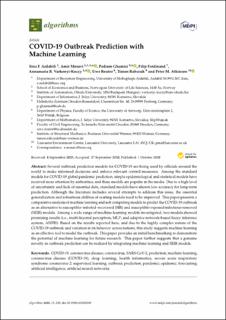COVID-19 Outbreak Prediction with Machine Learning
Peer reviewed, Journal article
Published version

View/
Date
2020Metadata
Show full item recordCollections
Original version
10.3390/a13100249Abstract
Abstract: Several outbreak prediction models for COVID-19 are being used by officials around the world to make informed decisions and enforce relevant control measures. Among the standard models for COVID-19 global pandemic prediction, simple epidemiological and statistical models have received more attention by authorities, and these models are popular in the media. Due to a high Level of uncertainty and lack of essential data, standard models have shown low accuracy for long-term
prediction. Although the literature includes several attempts to address this issue, the essential generalization and robustness abilities of existing models need to be improved. This paper presents a comparative analysis ofmachine learning and soft computingmodels to predict the COVID-19 outbreak as an alternative to susceptible–infected–recovered (SIR) and susceptible-exposed-infectious-removed
(SEIR) models. Among a wide range of machine learning models investigated, two models showed promising results (i.e., multi-layered perceptron, MLP; and adaptive network-based fuzzy inference system, ANFIS). Based on the results reported here, and due to the highly complex nature of the COVID-19 outbreak and variation in its behavior across nations, this study suggests machine Learning as an effective tool to model the outbreak. This paper provides an initial benchmarking to demonstrate
the potential of machine learning for future research. This paper further suggests that a genuine novelty in outbreak prediction can be realized by integrating machine learning and SEIR models.
